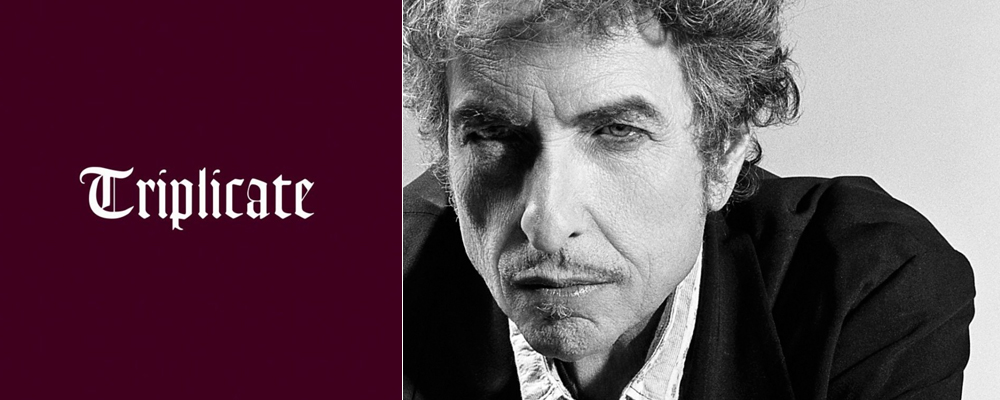Bob Dylan, Channels Sinatra and Hammerstein, Reinvents the Standards on ‘Triplicate’
Stephanie Hernandez
Bob Dylan’s iconic songbook has been dissected, puzzled over and lovingly pulled apart over course of his sixty-plus-year career. Yet here the legend stands still capable of making our jaws drop with his third collection of celebrated standards. Making his way through even more Frank Sinatra classics, Dylan also makes time to thumb through the pages of songwriters like Jerome Kern, Oscar Hammerstein and Hoagy Carmichael with enough sincerity to make you forget these songs aren’t his own. “Triplicate” is not only his largest set of recordings he has ever released – 30 songs over three discs – but quite possibly his most resplendent in recent memory. Yes, Dylan has moved away from producing the completely original work like “Bringing It All Back Home”, “Highway 61 Revisited” and “Blonde on Blonde,” but it also seems fitting that at this point in his life Dylan take time to honor the greats who came before him. A grand homage to what has come to be known as the Great American Songbook, “Triplicate” is Dylan’s way of expressing his respect for the unsung heroes of American music.
Dylan’s two previous salutes, “Fallen Angels” and “Shadows in the Night,” though beautiful in their own right, don’t seem to have the same power as “Triplicate.” Forging this record with his touring band, Dylan uses only this quintet, no peripheral big band instrumentation or additional strings in tribute to the archetypal days of Tin Pan Alley. Solemn in its delivery, the collection of tracks does seem to feel like recompense for a time and place in musical history that Dylan himself is often credited with bringing to an end. Careful selection of the tracks for this collection provide the listener with a well-rounded reworking of an era. Choosing about half his tracks from the over 50 albums Sinatra released between 1955 and 1970, Dylan made sure to carefully glean only those that dealt explicitly with loss in all its forms. Fusing velvety pedal steel with lightly picked acoustics and minimal use of brass give the album’s 30 tracks some much-needed cohesion in light of its charming variety.
Though Dylan’s weathered voice would not seem like the first choice to cover Sinatra’s smooth proclamations, it takes but one listen to his rework of “I’m a Fool to Want You” to change your mind. Deliberate and dignified, the point here is not the pristine quality of the vocals, but instead the song’s lasting human impression; his aged voice only adds to the number’s tactile pain. Though the tempo does pick up with the carefree trot of “I Guess I’ll Have to Change My Plans” and the relaxed blues machine of “The Best Is Yet to Come,” much of the three-disc compilation is slower and more methodical in its delivery. Most of the treasures found here delve into themes of trauma and loneliness, becoming a survivor’s guide to desolation. “Here’s That Rainy Day,” “I Could Have Told You,” and “This Nearly Was Mine” showcase Dylan’s innate ability to foster healing from heartbreak. Occasionally lifting the spirits with more jubilant standards (i.e. “These Foolish Things”), it’s darker tracks like “September Of My Years” that take hold of you and plunge you deep into uncharted waters.
“Triplicate,” though not the fresh batch of Dylan originals we all thirst for, is still monumental in its own right. The deep-seated admiration this Nobel Prize winner holds for the music and songwriters of the past is astounding and without doubt shines through on this collection. The most absorbing moments here come from Dylan’s take on Tin Pan’s lesser known hits, filling the air with his reworked, shined-up variants. A rumination on loss, Dylan’s recognizable gargle only serves to further point out the album’s pain-tinged thematics. Straining to hit higher registers, the man’s voice isn’t perfect, but it’s romantic and brings us closer to the truth he is trying to express. Like a meal made with love from a treasured family recipe, “Triplicate” serves as a reminder to honor the past – a powerful sentiment served up by the man who long ago ushered in a new era of music.
“Triplicate” is available on Apple Music March 31.

